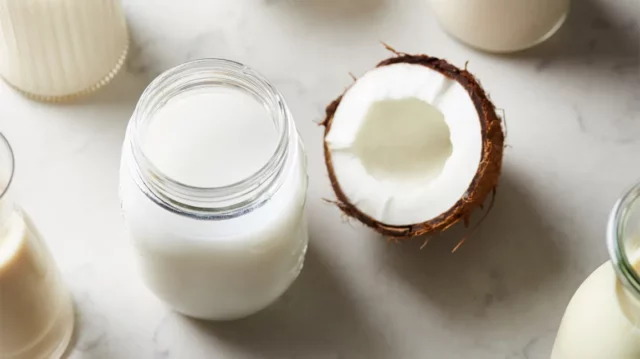Coconut water and coconut milk are both coconut products, but they’re different enough that you wouldn’t want to accidentally use the wrong one in a recipe. (Cue flashbacks to the time I accidentally used cream of coconut instead of coconut cream to make a whipped cream layer in a dairy-free tiramisu and had to start all over!) Save yourself another trip to the grocery store by learning the main differences between these two common coconut products, from flavor and texture to nutritional content.
Where Does Coconut Milk Come From?
Coconut milk is made from the meat of mature coconuts. You can make your own at home by combining shredded coconut and warm water and straining it. At the grocery store, you’ll see coconut milk in two different forms: canned and in cartons. The former is typically used in recipes like Thai curries, while cartons of coconut milk beverage are more of an alternative to cow’s milk. “Canned coconut milk is usually thicker, creamier and less diluted than cartons [of coconut milk] which often contain stabilizers, more water and potentially natural flavoring,” explains Olivia Roszkowski, chef-instructor of plant-based culinary arts at the Institute of Culinary Education. “They are usually not interchangeable when re-creating a recipe.” If a recipe calls for canned coconut milk, she recommends sticking to full-fat cans (especially if you’re planning on whipping it up for a nondairy whipped cream).
READ ALSO: Say Goodbye To Bad Breath With These Powerful Natural Remedies
While it’s common to drink coconut water as a standalone beverage, Roszkowski notes that coconut milk is most commonly used as an ingredient. You can use it to add a creamy flavor and body to soups and curries (sans dairy), or add it to smoothies and pancake and cake batters to replace cow’s milk. “Coconut milk can be reduced down with coconut sugar to form a caramel, or blended with cashews, refined coconut oil and a sweetener for a no-churn ice cream base,” Roszkowski says. “Or use it when cooking grains to make coconut rice or an extra-creamy batch of oats.” You can also pop a can of coconut milk into the fridge, then scrape off the layer of cream and whip it up into coconut cream.
Is Coconut Milk Good for You?
While coconut milk has more calories and fat content than coconut water (more on that later), it also contains more iron. “Saying any one food is good for you is tricky––what matters most is that our overall diet is diverse in nutrients and the proper portions for you (not anyone else!). In that respect, coconut milk or coconut water can definitely fit,” says Alyssa Pike, RD, senior manager of nutrition communications at the International Food Information Council. She adds that coconut milk is often used as a dairy replacement to make dishes creamy and that the fat content can help keep you satisfied.
Nutrition information for 1 cup of coconut milk:
| From a carton | From a can |
| Calories: 76 | Calories: 445 |
| Protein: 0.5 grams | Protein: 4.5 grams |
| Fat: 5 grams | Fat: 48 grams |
| Carbohydrate: 7 grams | Carbohydrate: 6 grams |
Where Does Coconut Water Come From?
Coconut water comes from the inside of young coconuts. It’s relatively clear, slightly sweet and has a thinner consistency than coconut milk. “Refrigerated versions will most likely be less pasteurized and taste closest to what it is like to crack open a coconut,” Roszkowski says.
As far as recipes go, coconut water is as versatile as coconut milk. Use it to make smoothies, popsicles, cocktails (like this yummy Coconut Margarita) and raw vegan desserts. Roszkowski notes that coconut water is best utilized in cold applications because some of its nutritional benefits subside once it’s heated.
Is Coconut Water Good for You?
Coconut water is a hydrating drink that contains vitamin C plus electrolytes like magnesium, potassium, sodium and calcium, notes Pike. “Coconut water can be a source of hydration, especially to rehydrate after physical activity or after illnesses that cause vomiting or diarrhea,” she says. And while coconut water has fewer calories than many fruit juices or sugar-sweetened beverages, it isn’t calorie-free. If you’re watching your calorie intake, Pike recommends sticking with plain water.
- Calories: 46
- Protein: 2 grams
- Fat: 0.5 grams
- Carbohydrate: 9 grams
FAQs
What’s Inside a Coconut—Milk or Water?
The clear liquid found inside a coconut is coconut water. “Coconut water is predominantly found in young coconuts that have a green exterior,” says Roszkowski. This is because young coconuts have a higher water content, and the water inside has a more pleasant taste. “As a coconut matures, the fat content of the coconut meat increases, which is why young coconuts are not predominantly used to create coconut milk,” she says.
Is Coconut Water Good for Electrolytes?
While coconut water contains electrolytes like magnesium, potassium, sodium and calcium, Pike notes that “most people don’t exercise for long enough or at a level of intensity that necessitates replenishment of electrolytes from a drink like coconut water.” As far as hydration goes, water is still the gold standard. “Think of coconut water as an option (not the only one!) for when electrolytes need to be replenished,” she says.
Does Coconut Water Taste the Same as Coconut Milk?
While coconut water and coconut milk both come from the same fruit, coconut water has a thinner, clearer consistency and a slightly sweet flavor. Coconut milk, on the other hand, is thicker, creamier and has a nutty flavor.
Can I Use Coconut Water Instead of Coconut Milk?
Because of the differences in flavor and consistency (not to mention fat content and calories), coconut water cannot be used in place of coconut milk in most recipes.








